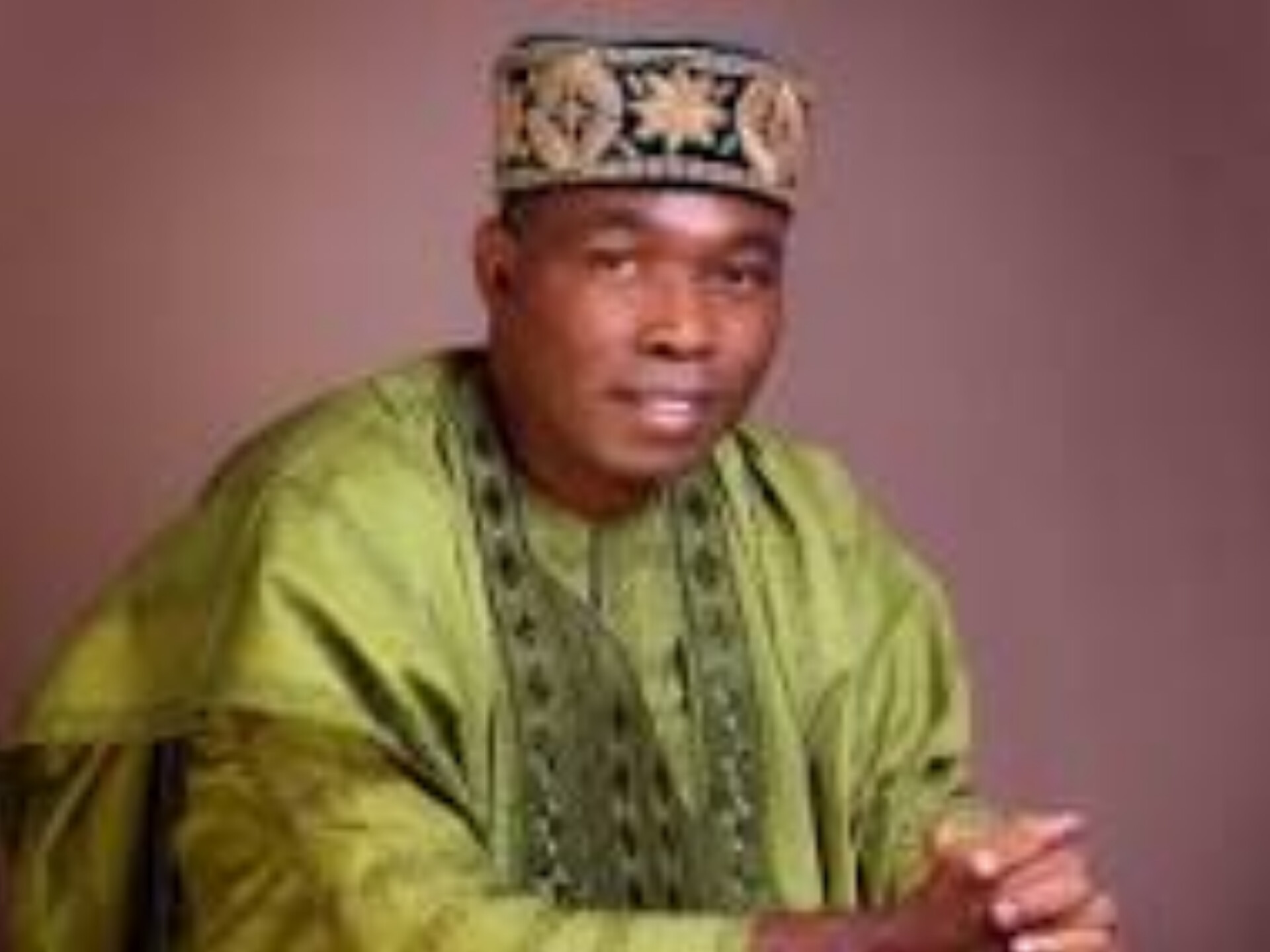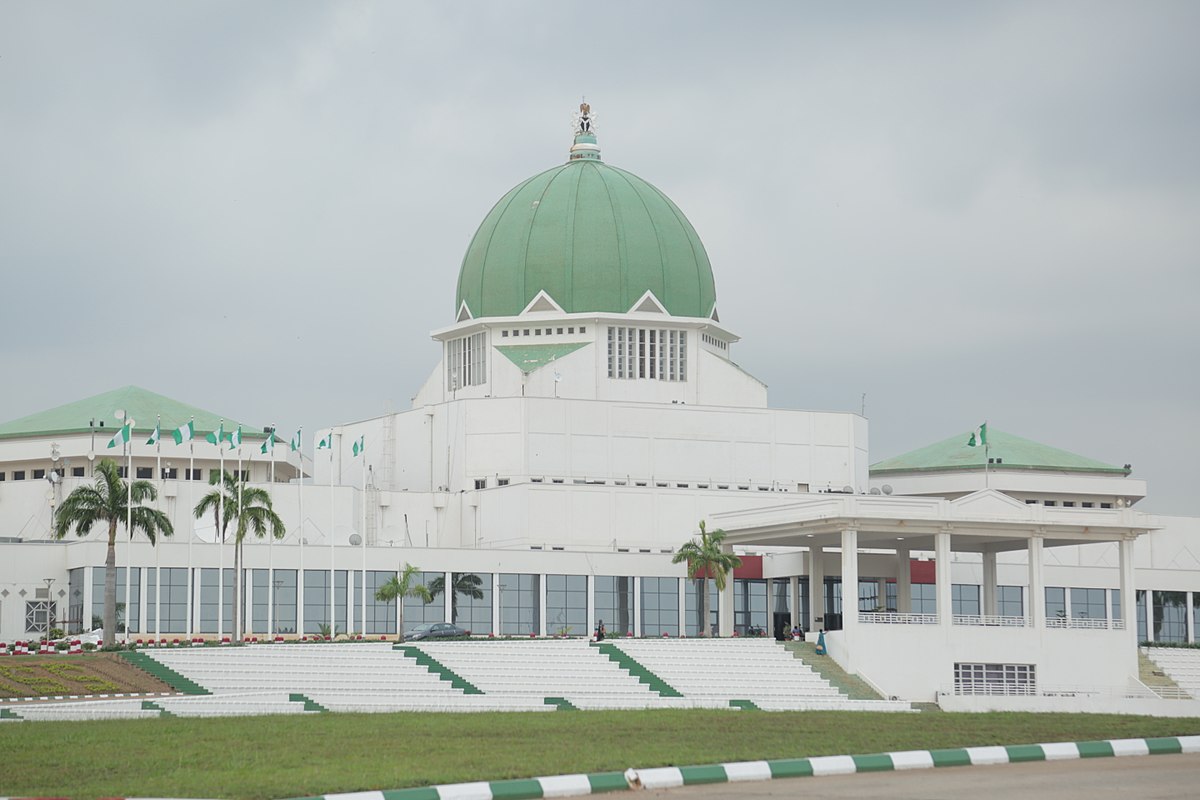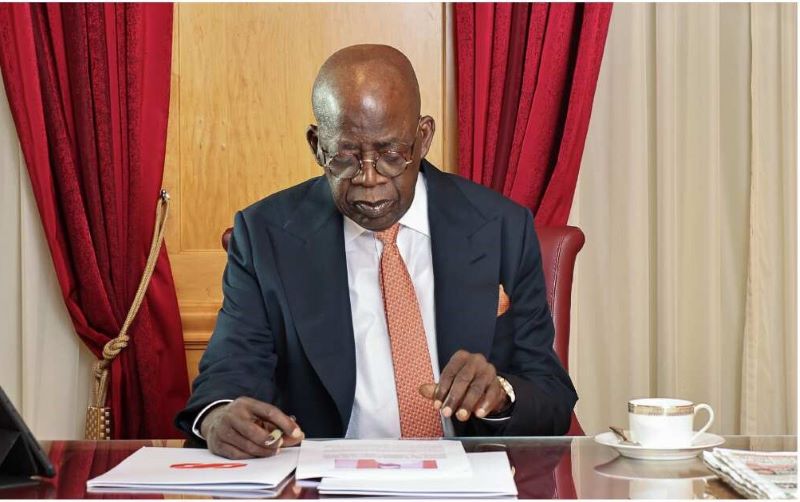Legislature
10th NASS: Over 150 Reps members-elect accompany Tajudeen Abass as he visits APC secretariat

***Adamu harps on need to sustain consultation with aggrieved aspirants
At least 150 House of Representatives members-elect on Tuesday stormed the national secretariat of the ruling All progressives Congress (APC) in solidarity with its preferred candidate for speakership, Dr Tajudeen Abass.
Abass who was at the secretariat of the party for a consultative meeting expressed appreciation to the Sen Abdullahi Adamu led national working committee (NWC) over the decision to nominate him as the next Speaker of the House of Representatives.
Abbas who represents Zaria federal constituency of Kaduna state on the APC platform, accompanied by members of the Joint task 10th Assembly team
reiterated his commitment towards the protection of the interest of the party, the institution of the legislature and the entire country.
He called on the party’s leadership not to rest on their oars in replicating the successes recorded in the recently held general elections by delivering the leadership of the 10th National Assembly.
Kalu who expressed appreciation over his nomination as the Deputy Speaker of the House remarked that the decision would calm frayed nerves in the South East geopolitical zone over the cry of exclusion and marginalisation over the power sharing arrangement in the country.
He noted: “You sat and did the right thing. I never visited any of you, I never lobbied any of you, I never gave any of you any money, but you sat and picked me to be the DS. That means you were dispassionate about your decision.
“We are promising you that we will protect the institution. The sovereignty of the Legislature will be upheld but not overlooking inter-dependence of all arms.
“I pledge that my principal will be given the support to succeed.
The Southeast is impressed that the party considered us this time around. This shows that the party is diversity sensitive.”
The Co- Chairman of the Joint Task 10th Assembly, Mr Usman Kumo is upbeat that the duo of Abass and Benjamin Kalu would coast home to victorious with over 250 out of 360 available votes of newly elected members of the House of Representatives.
Kumo who chairs the House committee on Police Affiars insist that the decision by the party to settle for the duo of Abass and Benjamin Kalu as Speaker and Deputy Speaker of the House of Representatives was in tandem with international best practices.
Kumo said the decision by the party was well thought out as the duo do not only have the right temparament, but have the requisite competence and experience to preside over the affairs of the House of Representatives.
Assuring that his team would do all within their powers to ensure they emerge victorious, he warned against the repeat of the acrimonious relationship that existed between the legislature and executive arms under the Senator Bukola Saraki led leadership of the national Assembly.
Kumo who was accompanied by no fewer than 100 members elect drawn from the APC, NNPP, LP, ADC, SDP, APGA assured that the House under the leadership of Tajudeen Abass would sustain the cordial and beneficial working relationship between the executive and legislative arms witnessed within the last four years.
Said he: “The Joint Task – 10th Assembly is a group of members-elect of the 10th House who came together for the unity of the country and the stability of the House.You people are talent hunters, and you have hunted well.
“On Rt. Hon. Tajudeen Abbas, from 1979 to date, there is no parliamentarian in Nigeria who was privileged to sponsor 74 Bills. What we want to do now is to promote synergy between the Executive and the Legislature. Out of the 74 Bills, 21 were signed into law.
“The chairman of our party is the number one witness that if you go against your party, you may not represent your people well. We intend to promote this product because we need that synergy and harmonious relationship. Our zonal interventions and constituency projects are implemented 100% under the 9th Assembly because of the good relationship between the Executive and the Legislature.
“All of us here are more than willing, the ones you see here, others have left for their constituencies after the induction. We would have brought over 250 members-elect here. We are going to ensure that we implement your zoning undiluted 100 percent.”
Adamu insisted that the decision by the party on the preferred candidates for the national Assembly leadership was arrived at after due consultations with the President -Elect, the NWC members and critical stakeholders of the party across the country.
He admonished the joint task team to sustain the ongoing consultations with those jostling for the speakership seat and other critical stakeholders of the party to calm frayed nerves over the controversy surrounding the zoning arrangement of the party.
Abass who later fielded questions reporters after the parley with the APC NWC members dismissed the notion held in certain quarters that the party would reverse it’s decision on the zoning arrangement of principal officers of the national Assembly.
“To the best of our knowledge, the party is resolute on its earlier decision to sustain the announcement made earlier. We are not aware there’s any change of decision concerning the candidature of my humble self and my colleague from the House of Reps and my colleague in the Senate. There has not been any thing like that to the best of our knowledge.
On the issue of reaching out, he said: “I can assure you we are doing the best we can. Just a week ago if you have observed three aspirants, one of them is here with us, have come out publicly to declare their support on us.
“As we are talking today, I am engaging not less than three other contestants. We are talking and hopeful that at the end of the day we will be able to reach a precise destination.”
On what should Nigerians expect if he emerge the Speaker of the House, he said: “We are assuring them that case we have recorded in the 9th assembly will not only be sustained but it will be improved. Very soon we are coming with our sixteen-point agenda which will address each and every area we feel Nigeria should have improvement in the legislative chamber, please wait for the document to come out, you will see that Nigeria will move forward come June 13 202.”
Legislature
Adebayo Defends National Assembly’s Power to Remove CCT Chairman

The Social Democratic Party (SDP) presidential candidate in the 2023 general election, Prince Adewole Adebayo, has addressed the controversy surrounding the National Assembly’s removal of the Code of Conduct Tribunal (CCT) chairman.
Speaking on the matter, Adebayo argued that the legislature acted within its authority and emphasized the importance of integrity in public institutions saying that they have the power to remove the president and Commander-in-Chief of the Atmed Forces
The Nigerian Senate last Wednesday, invoked Section 157(1) of the 1999 Constitution (as amended) to remove the Chairman of the Code of Conduct Tribunal (CCT), Danladi Umar, from office.
The decision followed the adoption of a motion sponsored by Senate Leader, Senator Opeyemi Bamidele (APC-Ekiti), during plenary.
The motion titled “Invocation of Provision of Section 157(1) of the Constitution for Removal of the Chairman of the CCT” was unanimously supported by the Senate.
Senator Bamidele, while presenting the motion, emphasized the sacred role of the CCT in maintaining high moral standards in government business and ensuring public officials adhere to principles of accountability and integrity.
He argued that the conduct of Danladi Umar fell short of these expectations.
Key allegations against the embattled Chairman according to the Senate leader included Corruption and Misconduct with Multiple petitions alleging corruption and misappropriation of funds.
There were Reports of Mr. Umar being absent from office for over a month without official permission.
He was also accused of refusal to Cooperate with Senate Investigations as he only appeared once before the Senate Committee on Ethics, Code of Conduct, and Public Petitions and avoided subsequent invitations.
He was also accused of engaging a physical altercation with a security guard in the Federal Capital Territory, an incident described as unbecoming of a public servant coupled with ongoing investigations by the EFCC, ICPC, and DSS which the senate refferred to a gross misconduct and negligence.
The Senate replaced Umar with President Bola Ahmed Tinubu’s nominee Mr. Abdullahi Usman Bello whose appointment was confirmed on July 4, 2024.
This decision has sparked criticism, with some legal experts arguing that the legislative body relied on a section of the Constitution—Section 157(2)—that applies to the Code of Conduct Bureau (CCB) and not the tribunal.
Critics claimed the removal process was flawed and that the legislature overstepped its bounds.
However, Adebayo who is also constitutional lawyer of repute dismissed the assertions, asserting that the National Assembly has the constitutional authority to discipline public officers, including the CCT chairman.
Adebayo explained that under the principle of separation of powers, the executive, legislative, and judicial branches serve as checks on each other.
“The National Assembly has oversight powers over public institutions, including the judiciary. The CCT chairman, while heading a judicial body, is still a public servant subject to the disciplinary powers of other branches of government,” Adebayo said.
He added that the Code of Conduct Tribunal, unlike the superior courts, operates as a unique judicial body tasked with trying violations of the Code of Conduct. As such, it falls within the legislature’s purview to act when misconduct occurs.
“If the National Assembly and the executive agreed that an official should be removed, that decision stands. The same principle applies to other branches of government intervening in cases of misconduct within their counterparts,” he explained.
Adebayo emphasized that the debate should not be reduced to legal technicalities but should focus on the ethical standards required for such critical roles.
“The chairman of the CCT is the custodian of public ethics. Any hint of misconduct undermines public trust in the tribunal and the judiciary. Someone in such a position must be above reproach, as their role is to enforce the same standards they must exemplify,” Adebayo said.
Reports of alleged misconduct involving the former CCT chairman, including unprofessional behavior, have further fueled public outcry. Adebayo argued that officials in such positions should step down voluntarily when their integrity is questioned.
Addressing the legal arguments raised by critics, Adebayo highlighted the difference between the Code of Conduct Bureau (CCB) and the Code of Conduct Tribunal (CCT).
“The CCB is an administrative body under the executive, responsible for compliance and asset declaration. The CCT, on the other hand, is a judicial body tasked with trying violations of the Code of Conduct. While the two institutions are distinct, both are subject to oversight and discipline by the legislature and executive,” he explained.
Adebayo urged Nigerians to approach the issue with objectivity, focusing on accountability rather than partisan arguments.
“The removal of the CCT chairman is about preserving the integrity of our institutions. This is not a matter of partisanship or legal maneuvering—it’s about ensuring that public servants are held to the highest ethical standards,” he said.
While some critics have called for judicial intervention to challenge the removal, Adebayo maintained that the National Assembly’s actions align with constitutional principles.
He emphasized the need for public officers, particularly those in sensitive roles, to maintain the highest levels of decorum and professionalism.
“This incident should remind us of the importance of accountability in governance. The integrity of our public institutions must remain sacrosanct,” Adebayo concluded.
Legislature
NASS modifies NDLEA Act, Prescribes Life Imprisonment for Drug Traffickers

The National Assembly has modified the National Drug Law Enforcement Agency (NDLEA) Act to prescribe life imprisonment for individuals found guilty of storing, transporting, or concealing illicit drugs and substances.
The amendment was adopted on Thursday during plenary, presided over by Deputy Senate President Barau Jibrin, following broad support from the senators.
The amendment reflects a harmonised position of the Senate and the House of Representatives on Section 11 of the NDLEA Act.
The House had earlier passed an amendment prescribing life imprisonment for drug traffickers, while the Senate had proposed the death penalty.
To reconcile the differences, a conference committee of both chambers was convened. Senator Tahir Monguno, Chairman of the Senate Committee on Judiciary, Human Rights, and Legal Matters, presented the harmonised version to the Senate.
He urged lawmakers to adopt the House’s position of life imprisonment, arguing that enforcing the death penalty could lead to the execution of over 900 accused persons currently awaiting trial for drug-related offenses.
The Deputy Senate President who presided over the plenary had put the resolution to a voice vote, and the majority of senators supported the amendment.
The approved version stipulates life imprisonment for offenders.
The amended section now reads:
“Anybody who is unlawfully involved in the storage, custody, movement, carriage, or concealment of dangerous drugs or controlled substances and who, while so involved, is armed with any offensive weapon or is disguised in any way, shall be guilty of an offence under this Act and liable on conviction to be sentenced to life imprisonment.”
This amendment aims to strengthen the fight against drug trafficking while addressing concerns over human rights and the judicial implications of the death penalty.
The move is part of efforts to curb the growing menace of drug trafficking and its adverse effects on Nigerian society. According to Senator Monguno, the life imprisonment penalty strikes a balance between deterrence and humane judicial practice.
With the amendment, the NDLEA now has a robust legal framework to prosecute offenders and combat drug-related crimes effectively.
Legislature
President Tinubu urges Senate to approve ₦1.767trn External Loan

President Bola Ahmed Tinubu has formally requested the National Assembly’s approval for a $2.209 billion (₦1.767 trillion) external borrowing plan to finance part of the ₦9.17 trillion fiscal deficit in the 2024 budget. The loan, included in the 2024 Appropriation Act, is critical to the government’s broader strategy for economic recovery and growth.
In a letter to Senate President Godswill Akpabio, President Tinubu noted that the borrowing aligns with the provisions of Sections 21(1) and 27(1) of the Debt Management Office (DMO) Establishment Act, 2003. He also indicated that the Federal Executive Council (FEC) had approved the plan.
The President explained that the funds would be sourced through Eurobonds or similar external financial instruments. A detailed summary of the loan’s terms and conditions accompanied the letter to guide legislative scrutiny.
“This borrowing is necessary to address the budget deficit and fulfill our fiscal strategy for 2024. Swift approval will enable us to move forward with mobilizing these funds,” the President stated, emphasizing the urgency of the request.
Senate President Akpabio referred the matter to the Committee on Local and Foreign Deb
-

 Crime1 year ago
Crime1 year agoPolice nabs Killer of Varsity Lecturer in Niger
-

 News10 months ago
News10 months agoFCT-IRS tells socialite Aisha Achimugu not to forget to file her annual returns
-

 Appointment1 year ago
Appointment1 year agoTinubu names El-Rufai, Tope Fasua, others in New appointments
-

 News From Kogi1 year ago
News From Kogi1 year agoINEC cancells election in 67 polling units in Ogori-Magongo in Kogi
-

 News From Kogi1 year ago
News From Kogi1 year agoEchocho Challenges Tribunal Judgment ordering rerun in 94 polling units
-

 News1 year ago
News1 year agoIPOB: Simon Ekpa gives reason for seperatists clamour for Biafra
-

 Metro8 months ago
Metro8 months ago‘Listing Simon Ekpa among wanted persons by Nigeria military is rascality, intimidation’
-

 News11 months ago
News11 months agoKingmakers of Igu/ Koton-Karfe dare Bello, urge him to reverse deposition of Ohimege-Igu
